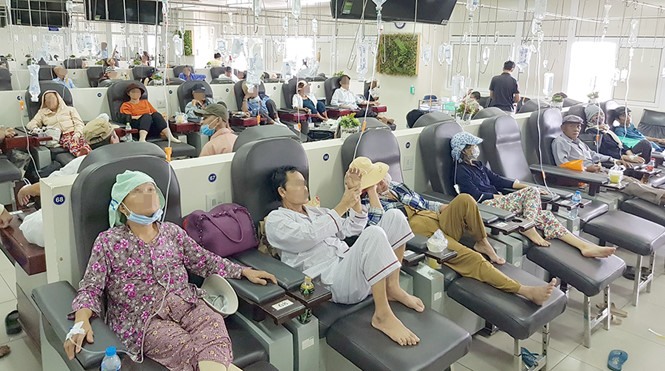 Society
Society

New Ministry of Health regulations on cancer treatment for outpatients from other provinces is causing problems to hospitals and thousands of sufferers.
 |
| Patients have chemotheraphy at Chợ Rẫy Hospital. — Photo thanhnien.vn |
HÀ NỘI — New Ministry of Health regulations on cancer treatment for outpatients from other provinces is causing problems to hospitals and thousands of sufferers.
In March last year, MoH issued a circular on daytime chemotherapy, radiotherapy and chemoradiotherapy at medical facilities. It said that doctors bear responsibility to administer treatment based on patients’ health and pathology.
The regulation is applied only for patients who live in provinces or cities where hospitals they receive treatment are located. Regarding patients from other localities, they have to sign commitment letters for voluntary treatment while no guidance has been released.
After having her brain tumor removed a 38-year-old woman who has asked not be named, from Đồng Nai Province, now gets chemotherapy at VNĐ26 million (US$11,500) from Chợ Rẫy Hospital in HCM City.
“There is no way I will sign a commitment letter. What if it is considered as a request for medical services then Việt Nam Social Security will no longer pay for my treatment expenses,” she said.
Another patient choose to receive outpatient treatment as she still has to work. As a single mother, she saves VNĐ1.5 million ($64.5) from her monthly income of VNĐ4 million ($172) for her kid.
“Since I had a brain tumor removal surgery at Chợ Rẫy Hospital, I’d better have chemotherapy here than other medical centres in Đồng Nai Province,” she said.
Sharing the same opinion, another 46-year-old patient, suffering from throat cancer patient, disapproves the circular.
“We should not sign any commitment letter,” he stressed.
Living 60km away from HCM City, she goes to Chợ Rẫy Hospital to receive radiotherapy then comes back to his Mekong Delta Province of Tiền Giang to work.
Some 9,000 outpatients frequently have chemotherapy and radiotherapy at HCM City Hospital of Oncology with 75 per cent of them living outside the city. The percentage at Chợ Rẫy Hospital is 70 out of 360 patients.
According to the National Hospital of Oncology (Hospital K) in Hà Nội, it is estimated to have 126,000 new cancer cases every year. Among common treatment methods, chemotherapy and radiotherapy, radiotherapy is the most essential.
On average, each patient has five sessions per week over about five weeks. Hospital K has witnessed the significant increase of patients in recent years, from nearly 11,800 in 2015 to 15,000 in 2017.
The cost for a chemotherapy session varies from hundreds of thousands to millions of đồng. Radiotherapy, based on different technologies, may cost from VNĐ500,000 to 1.5 million ($21.5 – 64.5) each time. As cancer is a chronic disease which requires a longtime treatment, most of patients are outpatients.
Bạch Mai Hospital’s deputy director Nguyễn Ngọc Hiền said for cancer patients not living in Hà Nội, they usually rent bedsits around the hospital. Therefore, to enjoy social insurance, they need to acquire a certificate of temporary residency from Hà Nội Police.
“I think that the circular aims to prevent hospitals from asking patients to receive outpatient treatments. Also, as patients from other provinces sign the commitment letter once any problem happens, they will not sue hospitals,” said Diệp Bảo Tuấn, deputy director of HCM City Hospital of Oncology.
According to Tuấn, patients are scared to sign committment letters. They told him they were completely dependent on doctors’ prescriptions based on their medical records but they would surely not sign anything.
“It should be doctors who advise patients whether to go to hospital or have outpatient treatment. Since 2017, no patient has submitted a single commitment letter although we have encouraged them,” Tuấn said.
On the other hand, Phạm Thanh Việt, head Chợ Rẫy Hospital’s Department of General Planning, said the circular created negative impacts on both hospitals and patients. Patients may have to bear a financial burden for treatment as once they sign, they agree to receive medical services that social insurance does not cover.
Nguyễn Trọng Khoa, deputy head of Department of Medical Facility Management under MoH, said the circular is aimed to ease the pressure on central level hospitals.
“However, since patients are our priority, they raise their opinions via our hotline. MoH and Social Security of Việt Nam will discuss to adjust regulations to serve them best,” he said.
According to Đào Việt Ánh, deputy director of SSV, the agency’s feedback on the issue will be announced next week. — VNS




